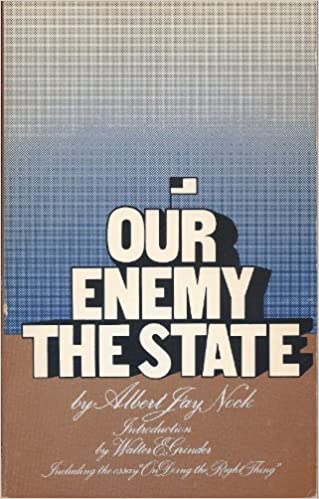
Tyler Cowen broke the sad news that Walter Grinder passed away. Tyler was one of the many intellectual protégées of Walter- certainly the most prominent and successful, the one with whom Walter felt the stronger bond, as he met Tyler when the latter was a teenager. But Walter, as the engine behind the Institute of Humane Studies, played a similar role to many, whom he gently and wisely steered in several new avenues of research.
Never underestimate the role of the person who puts a good book in your hands. Particularly if he imagines you could expand your views thanks to it and perhaps use it to see the world from perspectives you did not imagine before.
Walter did precisely that to perhaps countless people, some of whom honoured his sagacity by building on his insights, becoming thoughtful academics or serious think tankers.
In the last few years, when he was already seriously debilitated by illness, Walter did that predominantly by e-mail, engaging with a younger generation of libertarian scholars and authors that he perhaps never met in person. I was privileged to be in his e-mail list. Walter was not sending around comments or reviews to show his erudition off: he was writing about works he considered important and eye-opening, to carefully assembled mailing lists of people that he thought could benefit of those. I have myself met him only once, in early 2020 (before Covid). I know he corresponded, and rather intensely, with colleagues whose faces he never knew.
This is an effort too easily dismissed as the pastime of an old man. Walter was again playing, as the circumstances allowed him, the role of the intellectual impresario that so suited him. He belonged to the generation of libertarian scholars who envisioned and built the modern libertarian movement. A few of those, most notably Murray N. Rothbard, were constantly writing and producing page after page as ammunition for this new small movement. Others were quieter, like Walter and his friend Leonard Liggio, but weaving the web of connections and institutions which allowed the following generation of libertarian scholars to benefit from opportunities unknown to them.

Walter edited a new edition of Albert J. Nock’s Our Enemy, the State and Capital, Expectations, and the Market Process by Ludwig Lachmann, an author he helped many to appreciate better. He wrote many articles, always insightful, some of which can be found online. In the last few years, he was working, with John Hagel III, on a paper entitled “Evolving Liberalism to Thrive”, which I hope will still see the light. He was planning, if I’m right, for his books to be donated to the Institute of Liberal Studies in Canada. I hope this happened and that we may all go visit a “Walter Grinder Library” soon.
In different moments in history, classical liberalism shows different nuances. It is largely because of the circumstances, but also because of the personality of some highly influential authors. Vilfredo Pareto, for example, was very upset with some of the late 19th century liberals. He thought they were overemphasizing reasons for optimism, inebriated as they were by economic growth, and they forgot a key lesson by one of their very heroes, Frédéric Bastiat. That is, that government is basically plunder, and that exploitation mechanisms lie behind any kind of government.
This was an insight never lost on Walter. It may have been for generational reasons, because they lived through WWII and then the Korean war and, of course, because of Vietnam, or because of the influence of the so-called “old right,” or because they were scoffed by the “cold warriors,” but I think the great libertarians of Walter’s generation tended to have clearer in their mind the indissoluble link between government and violence. Perhaps Walter’s way of thinking is still best expressed in “Toward a Theory of State Capitalism: Ultimate Decision-Making and Class Structure”, written with John Hagel in the 1970s. He was certainly distressed by the reemergence of militarism, as he was by the lack of historical curiosity by some of the contemporary libertarian economists and pundits.
He was a very good man, intellectually as honest as he was pugnacious. May we do a fraction of the good he did, for this movement.

READER COMMENTS
Mark Brady
Dec 8 2022 at 12:37pm
Thank you, Alberto, for this thoughtful appreciation of our late dear friend, Walter Eugene Grinder.
David Lips
Dec 8 2022 at 5:49pm
Alberto, I concur in your comments regarding Walter and liberalism generally. Walter refrained, at least in later years, from describing himself as a libertarian. He much preferred the term “liberal,” perhaps to distance himself and those in the same intellectual tradition from the Libertarian Party. Walter was a staunch supporter of the free, unregulated market while being an unmitigated critic of militarism and an interventionist foreign policy. For this reason, Walter often harkened back to Richard Cobden and John Bright, who were members of the Anti-Corn Law League in England and who were also anti-imperialists. (For what it’s worth, “corn” is the British term for grain. The Anti-Corn Law League was concerned with taxes on imported wheat, not on “corn” as we understand it in the United States.)
Walter told me that he and Murray Rothbard had a falling out in the 1970s, but he did not explain. He and I met during the summer of 1979 at an Austrian economics conference held in Wisconsin. I rode with him from the airport to the college where the conference was to be held. He said during that ride that he was delighted at the growing interest in Austrian economics because not many years before, the number of people who had such an interest could have fitted inside a single living room.
Walter, above all, was a teacher and a resource. His knowledge of history, of economic thought, and of related subjects was vast. He delighted in connecting people of like minds and of sharing his enormous wealth of information with others. Like his close friend Leonard Liggio, Walter was not a figurehead as Murray Rothbard was. Walter was not a scholar in the same league with Murray and (like Leonard) published little that displayed his great erudition. Nevertheless, his quiet influence on scholars in the liberal tradition was huge. He is perhaps the last of his generation to have known so many key liberal figures of our time and to have had such an impact.
Dom Armentano
Dec 9 2022 at 9:26am
Walter was an old friend from back in my IHS days in the 1970s. He read various parts of my revised “Antitrust & Monopoly” and offered helpful sources and comments; I acknowledged him in the Forward. And of course John and Walter delivered that highly influential paper on state power and class structure at the 2nd Austrian Conference (Univ. of Hartford, 1975) with Murray and F.A. Hayek (among others) in attendance. Those were heady days.
Lost touch with Walter for many years but we had some recent email exchanges over the last 6 months. He said that he was ill but I had no idea he was that close to passing. You will be missed, my friend.
Dom Armentano
Vero Beach, Fl.
Gardner Goldsmith
Dec 10 2022 at 10:37am
Dom,
Thank you for your post and your recollections. I want to send you a direct message to also thank you for your work. In 1998, I used to commute via bus to one of the studios in LA, and I read “Antitrust and Monopoly” on it — with pen in hand, underlining, making notes in the margins. I was able to do that work thanks to the influence of the IHS.
Mr. Grinder’s efforts helped me learn and come into contact with others, like you, who also generated important ideas and research – people who hold and promote principles — that have played such a great role in spreading the truth.
Thank you…
GG
Susan Love Brown
Dec 9 2022 at 5:11pm
Walter Grinder gave me a copy of an article that made all the difference in the way I came to interpret the principles that I learned from being an anthropologist. He was incredibly generous, and I benefited immeasurably from my participation in IHS seminars and receipt of fellowships that saw me through graduate school. But beyond this, he is an example of a person who made an absolute difference, not just in my life, but in the lives of so many intellectuals and academics. I am grateful that Walter existed, and that I had the opportunity to know him.
Ron Manners
Dec 9 2022 at 8:39pm
Alberto,
Thanks for that great overview, and thanks to Brad Lips for passing on that sad news.
I was honored to be on Walter’s private email list over so many years.
I will always remember my first meeting with Walter at IHS – Palo Alto in 1982, where he introduced me to a fellow Australian ( now Dr David Hart) without realizing that David & I had been part of a small group creating an Australian Libertarian Party some eight years earlier (in 1974).
What a pleasure it has been to receive Walter’s regular emails as he connected so many of us “remnants”, as he referred to us.
Ron Manners AO
Daniel Klein
Dec 10 2022 at 4:15am
Thank you for your thoughts about Walter’s importance and influence. He influenced many greatly. For me, he remains a major touchstone for making sense of the world, and I will always feel gratitude for him and his big life.
Jane Shaw Stroup
Dec 10 2022 at 7:45am
A beautiful essay, Alberto. Thank you for sharing your appreciation of Walter Grinder, a person I often heard about but never knew.
Gardner Goldsmith
Dec 10 2022 at 10:19am
RIP…
Mr. Grinder’s work had a profound effect on my life. His efforts with IHS directly changed my career and allowed me to flourish on an intellectual level. I appreciate your work to remember him, and I, too, hope that the Grinder Library will be a real place very soon!
GG
Comments are closed.